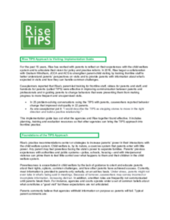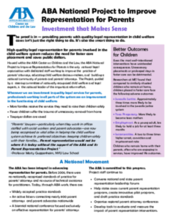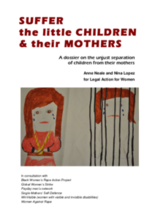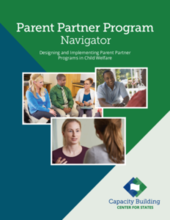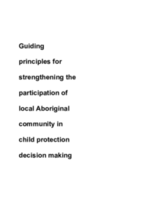This section highlights resources focused on the participation of parents and caregivers in decisions about children's care, including decisions about their own children and their placement in alternative care, as well as advocacy efforts to reform systems of care and protection for children.
Displaying 71 - 80 of 98
This implementation guide lays out what New York City child welfare agencies and Rise together found effective in strengthening parent-child visiting by training frontline staff and providing more information to parents. The guide includes planning, training and evaluation resources so that other agencies can bring the TIPS approach into frontline practice.
This study sought to understand parents' experiences of the supports and barriers to engagement in an evidence‐based parenting intervention (EBPI).
This qualitative study examined caregivers' experiences with SafeCare®, an evidence‐based programme that focuses on child neglect through modules on health, safety, and parenting.
This podcast gives listeners an overview of how Arizona Kinship Support Services implements the Family Group Conference (FGC) model.
In this session of the Advocacy Sector Conversations Forum, Barbara Carter and Kate Fitt discussed issues around child protection and provided some practical tips on how to support parents with disability in their dealings with child protection agencies.
This brief from the American Bar Association underscores how "providing parents with quality legal representation in child welfare cases isn’t just the right thing to do. It’s also the smart thing to do."
This Dossier aims to show the extent of the problem of children being taken into care in the UK and the trauma of family separation, the supporting evidence self-help groups of mothers are beginning to get from professionals, and to make proposals for action.
This study evaluates one mid-Atlantic state’s implementation of a FGDM called family involvement meetings (FIMs) to improve family strengths and their active engagement in the service planning process.
The Parent Partner Program Navigator guides child welfare administrators, staff, and parent leaders through key components of designing and implementing successful parent partner programs. Developed collaboratively with experienced parent partners and program coordinators, the Navigator offers guidance and capacity building resources based on research, practice experience, and implementation science.
This set of guiding principles aim to improve the collaboration between the NSW Department of Family and Community Services (FACS) and Aboriginal communities on child protection matters. It is intended to be a guide that may be used by Aboriginal communities and regional FACS offices across NSW.

